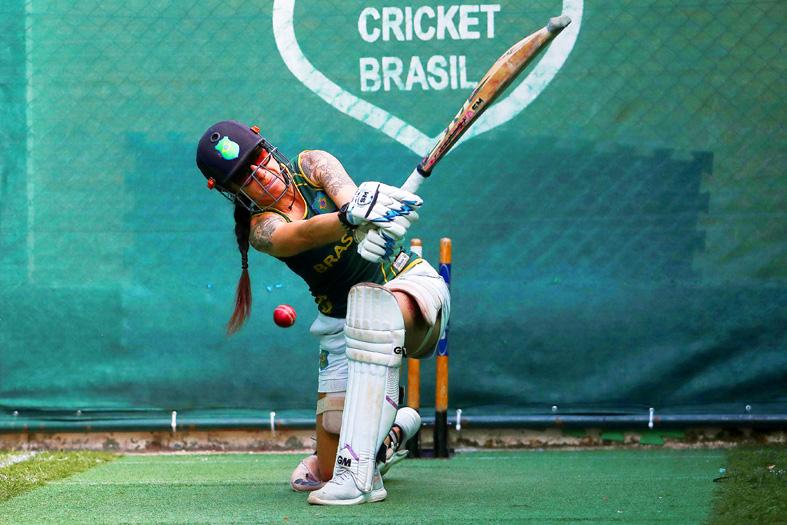When Brazil’s rapidly growing cricket program threatened to run out of bats, the solution was both simpler and harder than anyone anticipated: Make your own.
Matt Featherstone, a former England amateur cricketer who is president of Cricket Brazil, approached carpenter Luiz Roberto Francisco with a traditional bat made of English willow and asked him if he had the wood or expertise to make something similar.
Francisco, who was used to making chairs and cupboards out of medium-density fiberboard, was initially flummoxed.

Photo: Reuters
“I almost gave up lots of times. It’s really complicated,” he said. “We need time, lots of patience. There are lots of obstacles: It’s the handle, the cut, the wood, the machining. It’s not a piece that you put in the lathe and turn it and then it’s finished.”
The finished bats are in the hands of young cricketers in Pocos de Caldas, a small city in central Brazil.
Francisco has turned his workshop into a bat factory, making bats from pine, cedar, eucalyptus and other woods.
He has so far produced 80 bats and expects to ramp up production after the COVID-19 pandemic.
Pocos de Caldas has more than 5,000 young people who are taught cricket in the city’s 50 schools, playing mostly the T10 and T20 formats.
Since cricket missionary Featherstone moved there 21 years ago, he has convinced the mayor to build two training centers with nets and bowling machines, where young players can learn.
The sport has grown considerably over the past few years — especially among female players — and Brazil’s women’s teams have won four of the past five South American championships.
In the past, generous donations of bats, pads and balls recycled from professional games and sent over by the Lord’s Taverners, a leading cricketing charity in the UK, kept the Brazilians supplied.
With an increasing number of youngsters learning about yorkers, square drives and silly mid-offs — not to mention a pandemic that brought travel to a halt — a longer-term solution was needed.
“It was fine bringing in 15 or 20 or 30 bats to Brazil for a limited amount of people that play cricket,” Featherstone said. “Now we’ve got more than 5,000 young people in the development program with the idea — as soon as COVID-19 goes — of going to 33,000. That’s going to be impossible bringing bats or material for overseas, so we have to source it here. So therefore, why not make our own cricket bat factory?”
The imported willow bats would still be used by the top players, but the children’s and youth teams would increasingly use Francisco’s bats to hone their skills, one of which has become known as “the Brazilian shot,” an innovative drive that involves a 270-degree pivot to meet a leg side delivery, which has become a Brazilian specialty.
However, the search is on for a wood that would rival or even surpass English willow, and Featherstone is optimistic that a sustainable option is to be found in Brazil, a nation with more species of tree than anywhere else on the planet.
“I think we’ll find something as good as English willow,” he said.

Freddie Freeman homered and drove in four runs, Shohei Ohtani also went deep and Roki Sasaki earned his first major league win as the Los Angeles Dodgers beat the Atlanta Braves 10-3 on Saturday night for their seventh straight victory. The Dodgers have won the first two games of the series to improve to 5-0 against Atlanta this year. Los Angeles’ three-game sweep at home early in the season left the Braves 0-7. Sasaki allowed three runs and six hits over five innings. The 23-year-old right-hander gave up a home run to Ozzie Albies, but received plenty of offensive support in his

Bayern Munich on Sunday were crowned German champions for the 34th time, giving striker Harry Kane his first major trophy, after second-placed Bayer 04 Leverkusen drew 2-2 at SC Freiburg. Bayern’s 3-3 draw at RB Leipzig on Saturday, when the Bavarians came from two goals down to take the lead before conceding a stoppage-time equalizer, meant defending Bundesliga champions Leverkusen needed to win at Freiburg to delay the title party. Leverkusen were two goals down before scoring twice in the final 10 minutes, but Xabi Alonso’s side could not find a third, as Bayern reclaimed the title at the first attempt after

THRILLER: Raphinha gave Barca a 3-2 lead with two minutes remaining of regular time, but Francesco Acerbi equalized the game in the second minute of added time Davide Frattesi on Tuesday fired Inter into the UEFA Champions League final with an extra-time winner that gave the Italians a stunning 4-3 triumph over Barcelona, 7-6 on aggregate. Italy midfielder Frattesi won a tie for the ages under a downpour in Milan when he lashed home in the 99th minute, sending a packed and rocking San Siro wild with joy. Simone Inzaghi’s team will face either Arsenal or Paris Saint-Germain at the end of this month in Munich, Germany, where they would feel they have a great chance to be crowned kings of Europe for a fourth time after

INTER AWAIT: Superb saves by PSG ’keeper Gianluigi Donnarumma inspired the victory, as Arsenal were punished for misses, including one by Bukayo Saka Arsenal on Wednesday fell short on the big stage again as their painful UEFA Champions League semi-final exit against Paris Saint-Germain left Mikel Arteta to rue his club’s failure to provide him with enough attacking options. Arteta’s side were unable to reach the Champions League final for the first time in 19 years as PSG clinched a tense 2-1 win at Parc des Princes. Trailing 1-0 from last week’s first leg in London, the Gunners made a blistering start to the second leg, but could not convert their chances as Gianluigi Donnarumma’s superb saves inspired PSG’s 3-1 aggregate victory. Arsenal were punished for